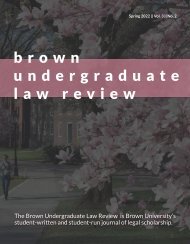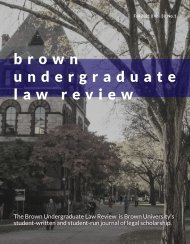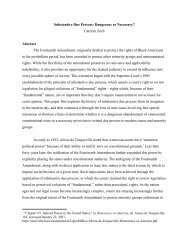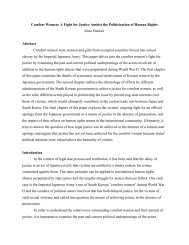Brown Undergraduate Law Review — Vol. 2 No. 2 (Spring 2021)
We are proud to present the Spring 2021 issue of the Brown Undergraduate Law Review. We hope that the works contained herein offer insight and inspiration to all who read them.
We are proud to present the Spring 2021 issue of the Brown Undergraduate Law Review. We hope that the works contained herein offer insight and inspiration to all who read them.
You also want an ePaper? Increase the reach of your titles
YUMPU automatically turns print PDFs into web optimized ePapers that Google loves.
The Failure of the Treatment of Low-Level Offenders in the Juvenile Justice System<br />
detained for stealing money from a women?s locker room.<br />
The judge used the standard of proof applicable in civil<br />
cases, as established by Section 744(b) of the New York<br />
Family Court Act, which is lower than ?beyond a<br />
reasonable doubt? required in criminal trials. The US<br />
Supreme Court declared the New York Family Court<br />
statute unconstitutional, requiring the standard of proof<br />
beyond a reasonable doubt in the adjudicatory stage of<br />
juvenile delinquency proceedings.<br />
The central argument on behalf of the State was that<br />
juvenile delinquency cases operated as civil cases and thus<br />
did not require the full protections of criminal cases,<br />
including the higher standard of proof. However, as the<br />
Court had decided in In re Gault, juvenile delinquency<br />
cases are considered civil as a "label of convenience" and<br />
the proceedings are entitled to the essentials of due process<br />
and fair treatment. Justice Brennan, writing for a<br />
five-member majority of the Court, said ?civil labels and<br />
good intentions do not themselves obviate the need for<br />
criminal due process safeguards in juvenile courts.? 67 The<br />
charged with a misdemeanor and placed on probation and<br />
the other detained after a felony conviction. In both cases,<br />
the judge denied the defendants a trial by jury. The <strong>No</strong>rth<br />
Carolina cases involved a group of 46 children, aged 11 to<br />
15, who were charged with various misdemeanors after a<br />
planned demonstration protesting a school consolidation<br />
plan. All these juveniles were also denied a trial by jury<br />
and a public trial.<br />
The Court ruled the due process clause of the Fourteenth<br />
Amendment did not grant the right to jury trial in state<br />
juvenile court delinquency proceedings. The opinion,<br />
written by Justice Harry Blackmun and joined by three<br />
other members of the Court, detailed that with In re Gault<br />
and In re Winship, the Court attempted to give procedural<br />
orderliness to the juvenile courts, while maintaining the<br />
atmosphere of flexibility, individuality, and rehabilitation.<br />
The Court stated mandating jury trials in the juvenile<br />
system would remake the courts into a "fully adversary<br />
process," against the founding principles of a separate<br />
juvenile court system. 69<br />
Court argued that these protections were constitutionally<br />
The appellants argued the proceedings were ?substantially<br />
necessary for the juvenile courts and would not<br />
similar?to a criminal trial, and therefore should be afforded<br />
compromise the confidentiality, informality, and flexibility<br />
the same due process protections granted in criminal trials.<br />
needed in juvenile proceedings. 68<br />
With the Court on a trend of increasing due process rights<br />
for juvenile courts, McKeiver et al. v. Pennsylvania (1971)<br />
marked the end of due process right expansions for<br />
juvenile proceedings. McKeiver combined two writs of<br />
certiorari, one from the state Supreme Court of<br />
Pennsylvania and the other from the state Supreme Court<br />
of <strong>No</strong>rth Carolina, to determine whether the due process<br />
clause gave the right to trial by jury for juvenile<br />
However, the Court disagreed, stating that the jury trial<br />
would not remedy the defects previously outlined in the<br />
juvenile justice system, both by the Court in Gault and<br />
through President Lyndon Johnson?s Commission on <strong>Law</strong><br />
Enforcement and Administration of Justice report, which<br />
the Court cited in its opinion. On the contrary, the Court<br />
argued, a jury trial would not lend to the fact-finding<br />
function of the court, and the juvenile court system was<br />
still entitled to different functions, related to rehabilitative<br />
delinquency proceedings. The Pennsylvania cases goals, than criminal trials. 70<br />
concerned two boys, aged 15 and 16, one of whom was<br />
66. In re Gault, 387 U.S. 1, 28.<br />
67. In re Winship, 397 U.S. 366.<br />
68. Ibid.<br />
69. In re Winship, 397 U.S. 366, 545.<br />
70. McKeiver v. Pennsylvania, 403 U.S. 543.<br />
<strong>Brown</strong> <strong>Undergraduate</strong> <strong>Law</strong> <strong>Review</strong><br />
16










